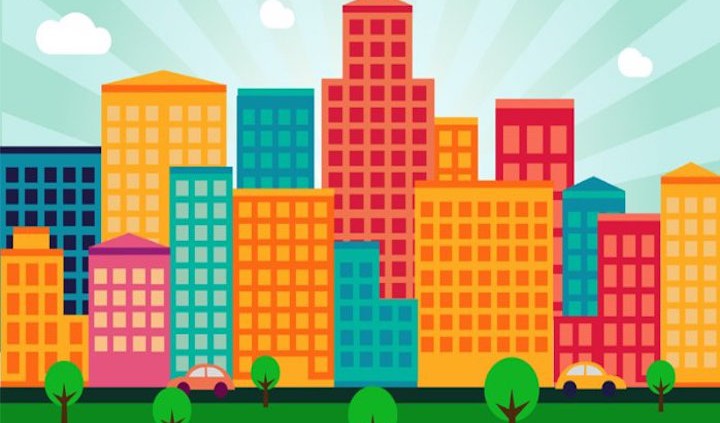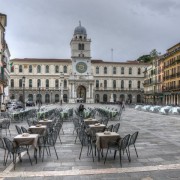The Smart City Opportunity
 Jonathan Reichental, Ph.D.
Jonathan Reichental, Ph.D.
CIO, City of Palo Alto
@reichental
Three million more people move into cities every week
Assuming that current trends continue, our future belongs to cities. Already half of all humans on the planet live in cities, and by 2050 a full 70 percent of civilization will live, work, and play in an urban environment.
To get a sense of the scale and speed of this global transformation, the United Nations says that 3 million more people move into cities per week. It’s creating staggering challenges. Cities already burdened with intractable problems experience a constant stream of new arrivals all requiring housing, jobs, energy, transportation, and so much more. Urbanization has enabled so many of us to rise to a higher quality of life, but it has also created unprecedented problems that are quickly undermining the benefits it once created.
Anyone who lives in a city sees and experiences these issues first-hand. This isn’t an abstract topic. Together we must commit to bold new solutions. To create a future urban environment that is healthy and sustainable will require a new operating system for our cities.
What do I mean by a city operating system?
Every day, in thousands of cities around the world, a cycle repeats itself. For billions there is a march to work, school and other activities. Machines spin up. Transportation systems engage. Energy is produced and consumed. Products are made. Data flows. Buildings heat and cool. Services respond. By evening, we’re home, ready to rest and begin again tomorrow. There’s a complex system of interdependencies that enables this all to function. It’s a city operating system. For most of us, experiencing these mechanics every day is both amazing and exasperating — sometimes simultaneously.
We owe it to ourselves and to future generations to create smarter cities.
Today, under duress, this operating system is largely inefficient and its fragility is glaringly exposed. If you sit for hours in traffic bumper to bumper or press up against one another in a train or circle endlessly searching for a parking space, you know our transportation systems are broken. If you get frustrated attempting to find city information or eliciting a city service or trying to have a voice to influence change in your community, you know municipal government can do so much more to meet expectations. Around every corner, time after time, we all experience the product of an urban environment in desperate need of reinvention. We owe it to ourselves and to future generations to create smarter cities.
What will it take to create this new operating system?
First we need the motivation. Are we sufficiently convinced that radical innovation is needed? The evidence suggests that we’re moving in the right direction. From India’s 100 smart cities initiative, to impressive projects in Amsterdam, Singapore, and Palo Alto, California, to new cities like Songdo in South Korea, Yachay in Ecuador, and Masdar in the United Arab Emirates, there’s a remarkable new momentum for change. But these cities and their respective leaders still represent only an elite group that are both talking and doing. It’s a good start.
Here are three areas to begin:
1. Culture
What these first-movers have in common, too, are the unique qualities of leadership, vision, and an appetite and permission for some risk-taking. In other words, they have the prerequisite attributes of culture that is necessary for creating a new operating system for their cities. It’s not impossible, but it will be harder for those cities without these cultural qualities to embrace the essential reinvention ahead. It will come, but it will take time. It’s an opportunity for new leaders and a push from the private sector to enable some of that new culture to emerge.
2. Civic engagement
Next, a new operating system will only emerge through partnerships and civic engagement. Given the huge costs and an almost infinite number of other competing priorities, local city governments will be unable to assume the responsibility necessary for building these smarter cities alone.
There’s ample opportunity for a myriad of partnerships with the private sector, with academia, federal agencies and the local community. Local governments are good at and well-positioned for convening organizations and individuals. Many cities already host challenges, hackathons, and meet-ups; they create incentives and platforms for participation; and they invite problem solvers to co-create. These are great starting points. Ensuring that local government is accessible and open will help get results. Cities with open data portals help to unleash valuable insight that is used to build solutions and drive decision-making.
3. Civic innovation
Finally, we’re going to need a whole new generation of technology innovation. We already see the advantages of mobile apps that help people find parking spaces, monitor and manage their energy use, interact efficiently with city services, make informed environmental choices, cycle safer, elicit medical assistance and so much more. We see how traffic signals will soon work in concert with connected cars to help with traffic flow. We’ve seen cities from San Paulo, Brazil to Los Angeles, California reduce crime by using data and intelligent software.
Forward-thinking cities are experimenting with the Internet of Things to connect all manner of infrastructure to data networks. This connected infrastructure is providing completely new capabilities such as the ability to more easily detect and report water leaks; for empty parking spaces that announce themselves; and for a series of monitors that can initiate the timely dispatch of public safety personnel in an emergency. But this is just the beginning. A new operating system for cities is going to require big thinking, new ideas, and all the attendant new technologies, skills and people that emerge from this innovation.
History demonstrates that the capacity for human ingenuity particularly in the face of overwhelming adversity is a powerful force.
The choice we face
If you’re an optimist like me, you’ll see the creation of a new operating system for cities as an incredible opportunity. There’s a lot to be concerned about as we look out into the future of our cities. We’re facing unprecedented challenges. History demonstrates that the capacity for human ingenuity particularly in the face of overwhelming adversity is a powerful force. Today we face a crossroads. A path that leads to the reinvention of our cities and another which sees the continuation of the rapid decay and decline of our urban spaces. Together we can choose the right path and create a new operating system for our cities.
Jonathan Reichental will be speaking at DTS on February 16.
DTS tickets are available now. Click here to secure yours.
============
Originally published on the TM Forum Blog:




